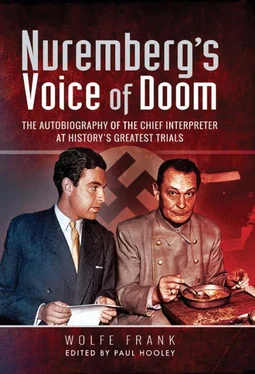‘And, you know as well as I do, Mr Frank, a late verdict means a mild verdict for my client,’ said German defence counsel Dr Aschenauer [3] Rudolf Aschenauer (1913-1983) was a German lawyer who became known as a ‘criminal defendant in war crimes and Nazi trials’. Aschenauer represented hundreds of accused war criminals, including Otto Ohlendorf in the Einsatzgruppen Trial. The address to which Judge Musmanno was referring (in note 4 above) and which caused Wolfe Frank to consider and then resign his position as Chief Interpreter was no doubt Aschenauer’s opening statement on behalf of Otto Ohlendorf (the defendant whose boasts and admissions under his interrogation Frank had found to be perhaps the most harrowing of all he heard and translated at the Nuremberg Trials). ‘Mr President! High Tribunal!’ Aschenauer had begun, ‘after submission of the documents on the part of the prosecution in the Case of the United States versus Ohlendorf et aI. it will be the task of the defence to make their comments concerning the documents themselves. The defence will be able to point out errors, to make clear to the Tribunal points which are contradictions in themselves, thus destroying in some cases the value the documents possess as evidence, as well as reducing the value of the entire evidence brought forth by the prosecution’. Aschenauer’s plea may have delayed proceedings, however in the end it made no difference in Ohlendorf’s case, he was convicted of crimes against humanity and war crimes committed during the Second World War. He was sentenced to death and hanged at the Landsberg Prison in Bavaria on 7 June 1951.
to me during a brief conversation in the corridors of the Palace of Justice five minutes later.
We had reached a late stage in the so-called ‘Subsequent Proceedings’ [4] The ‘Subsequent Trials’ (ST) or more commonly ‘Subsequent Proceedings’ (SP) – formally the Trials of War Criminals before the Nuremberg Military Tribunals – were a series of twelve US military tribunals for war crimes against members of the leadership of Nazi Germany other than those tried by the IMT (Note 5). The SP, like the IMT, were also held in the Palace of Justice.
instituted by the United States of America against Nazi war criminals, a phase during which political considerations were beginning to influence the attitude of the Allies towards the German people and, consequently, the meting-out of justice at Nuremberg. We had meted it out with a golden ladle during the International Military Trial (IMT) of Goering et al. [5] The Nuremberg Trials were the military tribunals held by the Allied forces after the Second World War. The trials were the prosecution of prominent members of the political, military, judicial and economic leadership of Nazi Germany, who planned, carried out, or otherwise participated in the Holocaust and other war crimes. They were held within the Palace of Justice in Nuremberg, Germany. The first and most high profile of the trials were those of the major war criminals (Goering and other leading Nazis). Held before the International Military Tribunal (IMT), they were described as being ‘the greatest trial in history’ by Norman Birkett, one of the British judges who presided over them. Held between 20 November 1945 and 1 October 1946 the IMT tried twenty-four of the most important political and military leaders of the Third Reich.
at which a lot of people had been condemned to death, and hanged, for crimes which were now drawing prison sentences – soon to be shortened, or even remitted, in the wake of the Western World’s awakening to the true Russia and the resulting warming of feelings towards the fast-developing new Germany.
That was the moment I decided it was time for me to quit. I had been one of the main interpreters during the ‘big trial’ and then Chief Interpreter at the Subsequent Proceedings (SP) for thirteen more months – I had heard enough about atrocities, mass murder, war crimes, extermination camps and genocide.
I was also thinking of a passage covering the sentencing at Nuremberg in R.W. Cooper’s book The Nuremberg Trial : ‘Tod durch den Strang! – Death by the Rope! – The words came to them in German through the headphones as each prisoner was brought up alone into the vast emptiness of the dock – the identical words pronounced by the Nazi People’s Court upon the perpetrators of the July plot. [6] On 20 July 1944, a plot by senior German military officials to murder Adolf Hitler and take control of his government failed when a bomb planted in a briefcase went off but did not kill the Nazi leader. Hundreds of people thought to be involved in the conspiracy were arrested and brought before the Nazi People’s Court – around 200 were executed.
They were uttered in translation by Captain Wolfe Frank, himself of German origin, who before departing from his country had watched the torchlight procession in Munich that hailed Hitler’s coming to power. A strange turn of the wheel that he was now to utter the words that set the seal on Hitler’s little day’.
I was remembering too a meeting I had had with Lord Mount Temple, [7] Lord Mount Temple was Chairman of The Anglo-German Fellowship, an organisation which existed from 1935 to 1939, and which aimed to build up friendship between the United Kingdom and Germany. Having publicly stated that membership of the Society did not assume support for Nazism or anti-Semitism, Lord Mount Temple resigned in November 1938 because of the Nazis treatment of German Jews.
the pre-war Chairman of the Anglo/German Fellowship, who I went see at his castle near Winchester just four years after that torchlight procession of January 1933. I had gone there to ask his help in getting my first wife’s passport restored to her. It had been confiscated to stop her from joining me in England. His Lordship didn’t trust my account of the events which had gone before, but he promised to help – and did so by interceding with his friend Joachim von Ribbentrop, [8] Ulrich Friedrich Wilhelm Joachim von Ribbentrop (1893–1946), more commonly known as Joachim von Ribbentrop, was Foreign Minister of Nazi Germany from 1938 until 1945, having served as German Ambassador to the United Kingdom from 1936. Ribbentrop was tried at Nuremberg and convicted for his role in starting the Second World War and enabling the Holocaust. Ironically, after having assisted Wolfe Frank to get his wife’s passport back, it was Frank who interrogated him, interpreted at his trial and announced to him the sentence of the court. On 16 October 1946 Joachim von Ribbentrop became the first of the Nazi war criminals to be hanged.
the then German Ambassador in London. The passport was returned. It was not valid for journeys abroad.
‘Silly of you to get into trouble over there in Germany,’ said Lord Mount Temple. ‘Hitler’s a great man, he’ll change the world for the better.’
I disagreed, rather heatedly. ‘He’ll change the world alright,’ I said, ‘he’s preparing for war, anybody can see that. I could while I still lived there until just a few months ago. And the concentration camps…’
I was firmly interrupted, ‘I think it is best for you to leave now,’ said his Lordship. ‘I will see what I can do for your wife. Good-bye!’
Some two and-a-half-years later I was walking past one of the clubs in London’s Pall Mall when I was hailed by the same Lord Mount Temple. ‘I say, young man,’ said the Lord from the top of the club’s steps.
I walked up to him. ‘You came to see me some time ago,’ he said sternly, ‘we, err, had a bit of an argument. I don’t like having to admit this to a young whippersnapper like you – I was wrong – good day!’
He, and many people with him, had been wrong then. They could be wrong again, I reflected, as I walked away from Dr Aschenauer on that November day in 1947 – as Judge Musmanno had been in his assessment of Aschenauer’s motives. There was clearly nothing I could do.
Читать дальше












